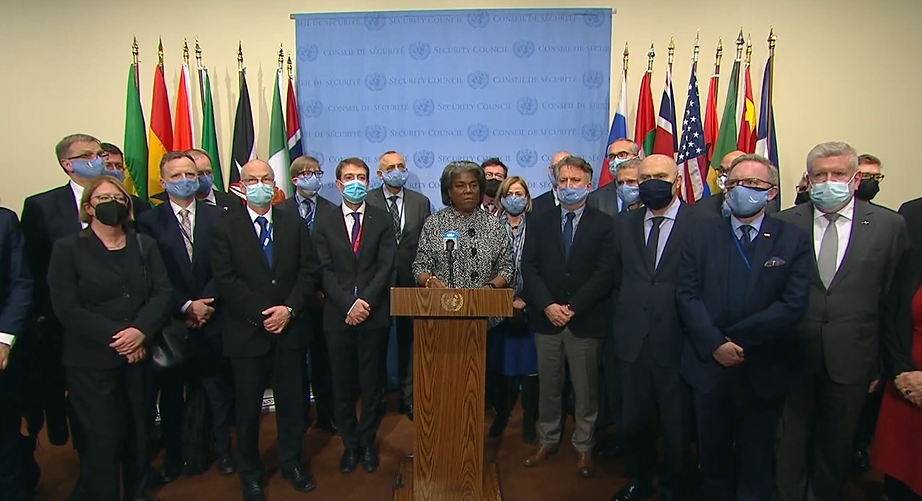The UN’s response to the Russian invasion of Ukraine may be indicative of a shift in world politics By Joshua Benson
The preamble of the United Nations’ charter cites the imperative to, as nations united, “reaffirm faith in fundamental human rights” and to practice “tolerance and live together in peace with one another as good neighbors” with the ultimate objective to foster international peace. Not only has Russia debased these values which, as a UN member they have sworn to uphold, but they have done so by invading a fellow UN member state. As the ongoing offensive in Ukraine from the Kremlin’s forces rages forth now into multiple weeks, the endeavor, which has been deemed the most catastrophic conflict carried out on European soil since the Second World War, has already provided a number of historically impactful instances for one to thoughtfully consider.
Most notable of these, perhaps, would be the unified manner with which the rest of the world has responded to Russia’s aggression. What first creeps to mind for some might be the unprecedented flurry of international sanctions being imposed, which have already seen hugely detrimental effects on the Russian economy (1 US Dollar is now equivalent to roughly 150 Russian Rubles). A momentous rebuttal to say the least, however, the most compelling display of unification has come not from analyzation of the Russian economy, but rather the more familiar backdrop of the United Nations General Assembly.
Photo from U.S. State Dept.
Following an emergency special session called as the result of UNSC inaction—or more frankly, Russian vetos—a resolution calling for the denouncement of the Russian invasion, referred to by Putin hitherto as a “special military operation”, was passed with widespread support. The effort fell to the General Assembly out of necessity, as Russia holds a permanent spot amongst the Security Council, and therefore harbors the inalienable right to veto any resolution that passes through the body, effectively killing any hope of progression on the spot.
The predicament, of course, is a shining example of the imbalance of power in the Security Council, as Russia (and any of the other 4 permanent members) may always veto any and all resolution that would condemn their states own actions or hinder its self interest. The resolution passed with a resounding 141 affirmative votes, which is considerably greater than the officially required 2/3 majority. Excluding Russia, a mere 4 countries voted negatively on the resolution, those being North Korea, Eritrea, Belarus, and Syria, or in other words the usual suspects.
Despite serving a mostly symbolic role with no true governing authority or military means to impose its will in an anarchic world structure, the United Nations remains perhaps one of the most softly powerful organizations to date with a global frame of influence. For its 193 member states, which fundamentally act as the voice of the international community, to unite against Russia almost unanimously, the weight of the gravity of this denunciation will surely be felt by Russia long after they cease their invasion.
The impassioned speeches delivered at the assembly and subsequent pledges of support to Ukraine so far seem genuine, as world leaders have seemingly been unafraid to assist the sovereign nation in its defensive efforts despite Putin’s threats on the matter. It has been heavily theorized that the reason for Putin’s engagement with Ukraine is to challenge and ideally dismantle the Western sphere of influence over world politics, and if this is true, then it would seem that the Russian president has achieved the exact opposite of what he has set out to achieve.
Photo from U.S. State Dept.
Not only did 141 representing delegations effectively denounce Russia and its actions, but the state of the European Union has all but solidified in its support of Ukraine.
The developing shift in the structure of world politics is becoming increasingly evident with each day this invasion proceeds, and as Russia’s own actions isolate it further from the graces of the world stage, it would seem that most of the rest of the world has used these unfortunate circumstances to decisively strengthen their resolve. The shift may even result in the reform of the United Nations itself, as many have cited the Russian invasion and following vetos of resolutions as proof of the outdated structure with which the Security Council continues to operate. Many proposals have been brought forth on the subject of reformation, but the most prominent is enlargement of the body, both in permanent and non-permanent membership, in order to increase representation. The most vocal in this desire is known as the ‘G4’ which includes Germany, Japan, India, and Brazil.
Over the coming weeks and perhaps even months, it would be fair to assume that the support for Ukrainian sovereignty will only bolster, and that the gap between 141 delegates and 193 delegates will continue to shrink, as the severity of Russian war crimes seems to intensify with each passing hour. The question at this point should not be will this conflict result in lasting political change, but rather, for how long after its conclusion will it persist? Rather than ask whether Russia will suffer an indefinitely damaged reputation in international relations, one should ask themselves exactly how long it will be before they are willing to do business with them again.
Joshua Benson is an international studies student at Utica University







